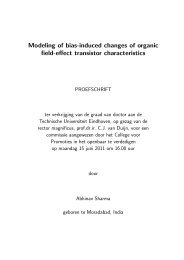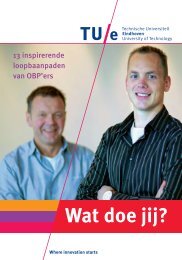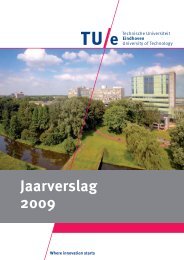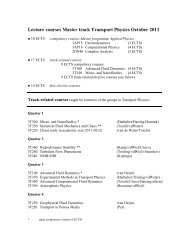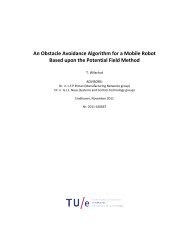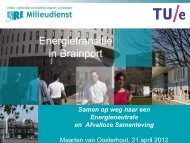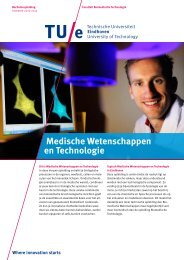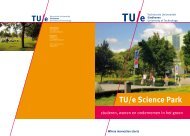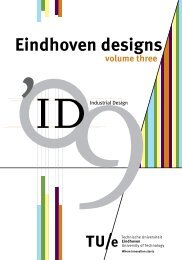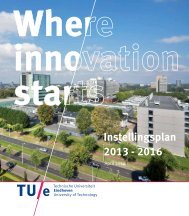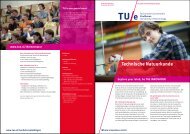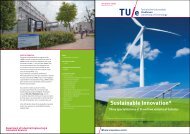Brochure technical specializations and Calculus
Brochure technical specializations and Calculus
Brochure technical specializations and Calculus
You also want an ePaper? Increase the reach of your titles
YUMPU automatically turns print PDFs into web optimized ePapers that Google loves.
TU/e Bachelor College<br />
Intake 2013-2014<br />
More information<br />
Everyone will automatically be registered for<br />
2WBB0, but we strongly recommend to switch to<br />
2WAB0 if your mark for the diagnostic test in the<br />
first week is below 7,0. You can take 2WAB0 from<br />
the second week on then. The diagnostic test<br />
is part of the <strong>Calculus</strong> course <strong>and</strong> will be held<br />
on the first Thursday of the first academic week<br />
(the 5th of September 2013,<br />
http://www.tue.nl/experiencemathness).<br />
We especially want to draw your attention to the fact<br />
that you should take 2WBB0 if you are envisaging<br />
a specialization in Robotics. 2WAB0 merely gives<br />
access to the Living <strong>and</strong> the ICT specialization.<br />
If you want to switch you have to follow<br />
this procedure: Please let us know by email<br />
(Onderwijsadministratie-IEIS@tue.nl) between<br />
now <strong>and</strong> the 10th of September 2013, 18.00h.<br />
A reminder about this will be sent to you by email in<br />
the first week. It is not possible to switch later than<br />
the 10th of September 2013, so please take care.<br />
More information about the Psychology & Technology<br />
major, see: www.tue.nl/psychology<strong>and</strong>technology<br />
(English flag).<br />
Major<br />
- Psychology & Technology<br />
Duration of studies<br />
- 3 years<br />
Language of communication<br />
- English<br />
(the technology courses of the Built<br />
Environment option <strong>and</strong> some electives<br />
are given in Dutch)<br />
Curriculum 1st year<br />
6 major courses:<br />
- Introduction to Psychology & Technology<br />
- App Programming<br />
- Social Psychology <strong>and</strong> Consumer Behavior<br />
- Research Methods<br />
- Brain, Body <strong>and</strong> Behavior<br />
- Technical Course (depending on which<br />
option you choose: ICT, Robotics or Built<br />
Environment)<br />
4 basic courses:<br />
- Mathematics<br />
- Physics<br />
- Modeling<br />
- Introduction to User, Society <strong>and</strong> Enterprise<br />
2 elective courses<br />
Psychology & Technology*<br />
Three <strong>specializations</strong> of P&T <strong>and</strong> two variants of <strong>Calculus</strong><br />
* This major is formally part of the Innovation Sciences Bachelor’s program<br />
Department of Industrial Engineering &<br />
Innovation Sciences Where innovation starts
The ICT specialization<br />
How can ICT be used, <strong>and</strong> how can the use of ICT be<br />
improved? For example 3D visualization <strong>and</strong> games.<br />
To allow depth to be perceived on a flat screen such<br />
as a TV, you need something to provide separate<br />
images for the left <strong>and</strong> right eyes. That’s why you<br />
use special glasses to watch Avatar or Harry Potter<br />
in 3D movies: the film sends two signals, <strong>and</strong> one<br />
lens blocks one of those signals <strong>and</strong> the other lens<br />
blocks the other signal, while your brain does the rest.<br />
In this respect, about 1 person in every 5 has<br />
less good eye coordination, which often leads to<br />
headaches or diplopia (double vision). In our 3D/e<br />
Lab we study people who are having trouble seeing<br />
3D, <strong>and</strong> we have developed tests to identify these<br />
problems in a simple way. This research contributes<br />
to the development of stereoscopic screens that<br />
can be used for gaming <strong>and</strong> television, as well as for<br />
medical visualization or 3D teleconferencing.<br />
The Robotics specialization<br />
‘Robotics’ focuses on the collaboration between<br />
humans <strong>and</strong> technological systems such as robots,<br />
<strong>and</strong> how robots can be used to carry out everyday<br />
tasks, for example in smart homes.<br />
The number of elderly people is increasing, <strong>and</strong><br />
there are fewer young people to look after them.<br />
Moreover many elderly people want to continue living<br />
independently for as long as possible. ‘Smart homes’<br />
are designed to provide intelligent support to help<br />
elderly people live in their homes by themselves.<br />
We are currently working on a system that combines<br />
these smart homes with social robots. The robot<br />
gives instructions, keeps an eye on things <strong>and</strong> calls<br />
for assistance if necessary. That involves all kinds of<br />
technological devices. How can you ensure a robot<br />
finding its way around the home? And there are just<br />
as many social aspects. What’s the best way for a<br />
robot to address a human being? How do we expect a<br />
robot to communicate?<br />
Do you want to switch<br />
to the other variant<br />
of <strong>Calculus</strong>?<br />
Please let us know!<br />
The four Robotics courses:<br />
• Signals<br />
• Computation<br />
• Fundamentals of Electronics<br />
• Sensing, Computing <strong>and</strong> Actuation<br />
This specialization requires 2WBB0, the formal<br />
variant of <strong>Calculus</strong>.<br />
Three <strong>specializations</strong> of P&T <strong>and</strong> two variants<br />
of <strong>Calculus</strong><br />
With this leaflet we want to inform you about<br />
two topics. The first is about the three <strong>technical</strong><br />
<strong>specializations</strong> of Psychology <strong>and</strong> Technology.<br />
The second about the relation between these<br />
<strong>specializations</strong> <strong>and</strong> the <strong>Calculus</strong> course that<br />
starts at the beginning of your study program in<br />
September.<br />
The first topic is on the <strong>technical</strong> <strong>specializations</strong><br />
you have to choose among in the Psychology <strong>and</strong><br />
Technology program: ICT, Robotics <strong>and</strong> Living.<br />
You have to make a final choice for one of these<br />
<strong>specializations</strong> in quartile 2. More information on<br />
these <strong>specializations</strong> you will find in this brochure.<br />
The second topic is the <strong>Calculus</strong> course which will<br />
take place in the first quartile of your first year.<br />
There are two variants of <strong>Calculus</strong>: the formal<br />
variant 2WBB0 (the B variant, code 2WBB0, see<br />
education.tue.nl, activities) <strong>and</strong> the applied variant<br />
2WAB0 (the A variant, code 2WAB0, see education.<br />
tue.nl, activities). Everyone will automatically<br />
be registered for 2WBB0 (please read the more<br />
information section on the back for further<br />
important information).<br />
In this brochure you will find information about the<br />
content of each specialization <strong>and</strong> the <strong>Calculus</strong><br />
variant each specialization requires. 1<br />
1<br />
In the first quartile of this year we will organize an information<br />
meeting to inform you more about the <strong>specializations</strong> in detail.<br />
Another example of our ICT research concerns<br />
gaming. Gaming is so much fun that some people<br />
get addicted to it. We are in the process of finding<br />
out whether gaming could be used in order to<br />
stimulate other behavior. For example, gaming can<br />
be used in physical therapy when people endlessly<br />
have to try to make the same movements to regain<br />
control <strong>and</strong> strength of an arm or leg after an<br />
accident or a stroke.<br />
The four ICT courses:<br />
• Hypermedia<br />
• Logic <strong>and</strong> Set Theory<br />
• Web Technology<br />
• Computer Networks <strong>and</strong> Security<br />
You will be admitted to this specialization with<br />
the applied or formal variant of <strong>Calculus</strong>.<br />
The Living specialization (not available for students<br />
who don’t speak Dutch)<br />
‘Living’ mainly focuses on the effects of the built<br />
environment on our wellbeing. Think about the<br />
impact of materials, the design of public space or the<br />
effects of lighting.<br />
Light is so important for us: we need it to see,<br />
to read, to navigate, to meet. We need it for our<br />
biological clock <strong>and</strong> what’s more light has a big<br />
influence on our behavior <strong>and</strong> performance. Research<br />
shows we can concentrate better by using red light<br />
<strong>and</strong> we become more creative when we are exposed<br />
to blue light.<br />
In our lab, we have seen that people feel more<br />
alert <strong>and</strong> react more quickly to strong light when<br />
compared to weak light, but we don’t know yet how<br />
much light is exactly needed <strong>and</strong> how long these<br />
results will last. That is why we study the impact light<br />
can have on human performance <strong>and</strong> the reasons for<br />
being so.<br />
The four Living courses:<br />
• Constructief Ontwerpen en Mechanica<br />
• Stedebouw en Architectuur in context<br />
• Bouwfysisch ontwerpen<br />
• Project P&T voor de gebouwde omgeving<br />
You will be admitted to this specialization with<br />
the applied or formal variant of <strong>Calculus</strong>.



